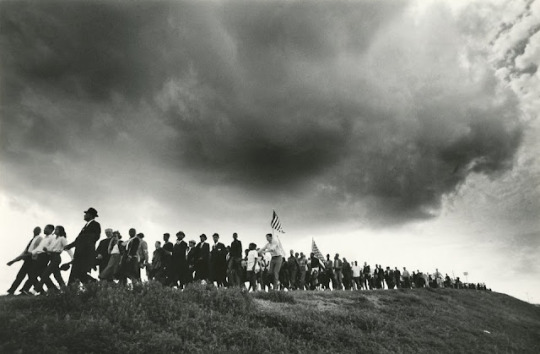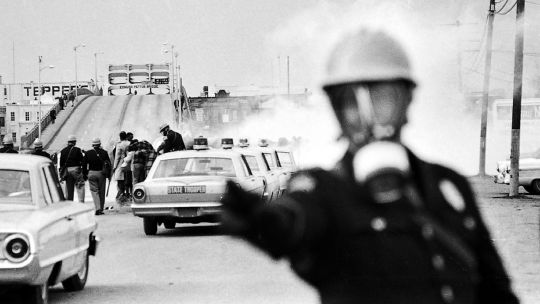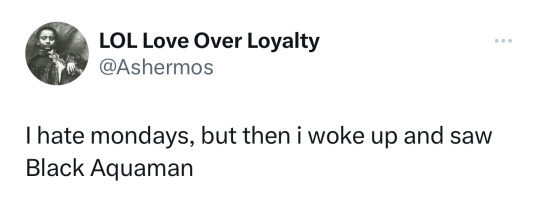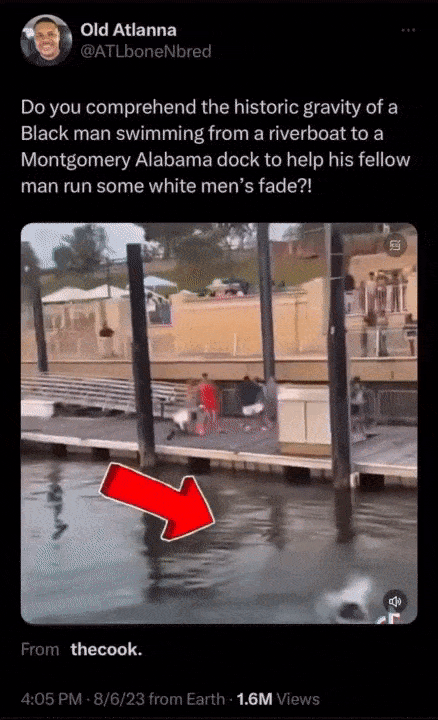#Selma To Montgomery
Explore tagged Tumblr posts
Text

Duffie Taylor (South, 2019)
#op#poem#poetry#prose poem#prose poetry#selma#selma marches#selma to montgomery#mlk jr#mlk#martin luther king jr.#duffie taylor#on freedom#civil rights movement
3 notes
·
View notes
Text

James Karales’ photograph of the Selma to Montgomery march for voting rights, Alabama, 1965 (via here)
* * * *
LETTERS FROM AN AMERICAN
March 6, 2024
HEATHER COX RICHARDSON
MAR 7, 2024
Black Americans outnumbered white Americans among the 29,500 people who lived in Selma, Alabama, in the 1960s, but the city’s voting rolls were 99% white. So, in 1963, Black organizers in the Dallas County Voters League launched a drive to get Black voters in Selma registered. The Student Nonviolent Coordinating Committee, a prominent civil rights organization, joined them.
In 1964, Congress passed the Civil Rights Act, but the measure did not adequately address the problem of voter suppression. In Selma a judge had stopped the voter registration protests by issuing an injunction prohibiting public gatherings of more than two people.
To call attention to the crisis in her city, Amelia Boynton, who was a part of the Dallas County Voters League but who, in this case, was acting with a group of local activists, traveled to Birmingham to invite Reverend Martin Luther King, Jr., to the city. King had become a household name after the 1963 March on Washington where he delivered the “I Have a Dream” speech, and his presence would bring national attention to Selma’s struggle.
King and other prominent members of the Southern Christian Leadership Conference arrived in January to push the voter registration drive. For seven weeks, Black residents tried to register to vote. County Sheriff James Clark arrested almost 2,000 of them for a variety of charges, including contempt of court and parading without a permit. A federal court ordered Clark not to interfere with orderly registration, so he forced Black applicants to stand in line for hours before taking a “literacy” test. Not a single person passed.
Then on February 18, white police officers, including local police, sheriff’s deputies, and Alabama state troopers, beat and shot an unarmed 26-year-old, Jimmie Lee Jackson, who was marching for voting rights at a demonstration in his hometown of Marion, Alabama, about 25 miles northwest of Selma. Jackson had run into a restaurant for shelter along with his mother when the police started rioting, but they chased him and shot him in the restaurant’s kitchen.
Jackson died eight days later, on February 26.
The leaders of the Southern Christian Leadership Conference in Selma decided to defuse the community’s anger by planning a long march—54 miles—from Selma to the state capitol at Montgomery to draw attention to the murder and voter suppression. Expecting violence, the Student Nonviolent Coordinating Committee voted not to participate, but its chair, John Lewis, asked their permission to go along on his own. They agreed.
On March 7, 1965, the marchers set out. As they crossed the Edmund Pettus Bridge, named for a Confederate brigadier general, Grand Dragon of the Alabama Ku Klux Klan, and U.S. senator who stood against Black rights, state troopers and other law enforcement officers met the unarmed marchers with billy clubs, bullwhips, and tear gas. They fractured John Lewis’s skull and beat Amelia Boynton unconscious. A newspaper photograph of the 54-year-old Boynton, seemingly dead in the arms of another marcher, illustrated the depravity of those determined to stop Black voting.
Images of “Bloody Sunday” on the national news mesmerized the nation, and supporters began to converge on Selma. King, who had been in Atlanta when the marchers first set off, returned to the fray.
Two days later, the marchers set out again. Once again, the troopers and police met them at the end of the Edmund Pettus Bridge, but this time, King led the marchers in prayer and then took them back to Selma. That night, a white mob beat to death a Unitarian Universalist minister, James Reeb, who had come from Massachusetts to join the marchers.
On March 15, President Lyndon B. Johnson addressed a nationally televised joint session of Congress to ask for the passage of a national voting rights act. “Their cause must be our cause too,” he said. “[A]ll of us…must overcome the crippling legacy of bigotry and injustice. And we shall overcome.” Two days later, he submitted to Congress proposed voting rights legislation.
The marchers remained determined to complete their trip to Montgomery, and when Alabama’s governor, George Wallace, refused to protect them, President Johnson stepped in. When the marchers set off for a third time on March 21, 1,900 members of the nationalized Alabama National Guard, FBI agents, and federal marshals protected them. Covering about ten miles a day, they camped in the yards of well-wishers until they arrived at the Alabama State Capitol on March 25. Their ranks had grown as they walked until they numbered about 25,000 people.
On the steps of the capitol, speaking under a Confederate flag, Dr. King said: “The end we seek is a society at peace with itself, a society that can live with its conscience. And that will be a day not of the white man, not of the black man. That will be the day of man as man.”
That night, Viola Liuzzo, a 39-year-old mother of five who had arrived from Michigan to help after Bloody Sunday, was murdered by four Ku Klux Klan members who tailed her as she ferried demonstrators out of the city.
On August 6, Dr. King and Mrs. Boynton were guests of honor as President Johnson signed the Voting Rights Act of 1965. Recalling “the outrage of Selma,” Johnson said: "This right to vote is the basic right without which all others are meaningless. It gives people, people as individuals, control over their own destinies."
The Voting Rights Act authorized federal supervision of voter registration in districts where African Americans were historically underrepresented. Johnson promised that the government would strike down “regulations, or laws, or tests to deny the right to vote.” He called the right to vote “the most powerful instrument ever devised by man for breaking down injustice and destroying the terrible walls which imprison men because they are different from other men,” and pledged that “we will not delay, or we will not hesitate, or we will not turn aside until Americans of every race and color and origin in this country have the same right as all others to share in the process of democracy.”
As recently as 2006, Congress reauthorized the Voting Rights Act by a bipartisan vote. By 2008 there was very little difference in voter participation between white Americans and Americans of color. But then, in 2013, the Supreme Court’s Shelby County v. Holder decision got rid of the part of the Voting Rights Act that required jurisdictions with a history of racial discrimination in voting to get approval from the federal government before changing their voting rules. This requirement was known as “preclearance.”
The Shelby County v. Holder decision opened the door, once again, for voter suppression. Since then, states have made it harder to vote; in 2023, at least 14 states enacted 17 restrictive voting laws. A recent study by the Brennan Center of nearly a billion vote records over 14 years shows that the racial voting gap is growing almost twice as fast in places that used to be covered by the preclearance requirement.
Democrats have tried since 2021 to pass a voting rights act but have been stymied by Republicans, who oppose such protections. Last September, on National Voter Registration Day, House Democrats reintroduced a voting rights act, now named the John R. Lewis Voting Rights Act after the man who went on from his days in the Civil Rights Movement to serve 17 terms as a representative from Georgia, bearing the scars of March 7, 1965, until he died on July 17, 2020.
On March 1, 2024, 51 Democratic senators introduced the measure in the Senate.
Speaking in Selma last Sunday at the commemoration of the 59th anniversary of Bloody Sunday, Vice President Kamala Harris shared that the first thing she sees on walking into her office is a “large framed photograph taken on Bloody Sunday depicting an injured Amelia Boynton receiving care at the foot of [the Edmund Pettus] bridge.”
“[F]or me,” she said, “it is a daily reminder of the struggle, of the sacrifice, and of how much we owe to those who gave so much before us.”
“History is a relay race,” she said. “Generations before us carried the baton. And now, they have passed it to us.”
—
LETTERS FROM AN AMERICAN
HEATHER COX RICHARDSON
#Bloody Sunday#Selma To Montgomery#history#Letters from an American#Heather Cox Richardson#voting#voting rights#voting rights act#Edmund Pettis Bridge#Civil Rights Act
4 notes
·
View notes
Text

young activists at a Selma to Montgomery March, 1965
50 notes
·
View notes
Text
The Simpsons
There are so many great characters but so few options on tumblr :(
#homer simpson#marge bouvier#Bart#Lisa#Maggie#ned flanders#milhouse van houten#nelson muntz#Chief Clancy Wiggum#moe szyslak#Charles Montgomery Mr burns#ralph wiggum#patty and selma#krusty the clown#sideshow bob#sideshow mel#waylon smithers#carl carlson#lenny leonard#seymour skinner#edna krabappel#groundskeeper willie#comic book guy#kent brockman#Major Joe quimby#timothy lovejoy#barney gumble#apu nahasapeemapetilon#Random polls#Vote and choose your favorite one character on this poll and enjoy the result! Made by zdp 😎
15 notes
·
View notes
Text

Dear Mr. President:
Always there have been men who had contempt for the "word" although words have survived better than any other man-made things. St. John says, "In the beginning was the Word, and the Word was God." When you have finished using a weapon, someone is dead or injured, but the product of the word can be life and hope and survival. All of the greatness of our species rests on words -- Socrates to his judges -- the Sermon on the Mount, the introduction to Wyclif's Bible, later taken by Lincoln for the Gettysburg Address. And all of these great and irretrievable words have the bravery of fear and hope in them. There must have been a fierce but hollow feeling in the members of the Continental Congress when the clerk first read the words, "When in the course of human events --." Lincoln must have dwelt with loneliness when he wrote the order of mobilization.
In our history, there have been not more than five or six moments when the word and the determination mapped the course of the future. Such a moment was your speech, Sir, to the Congress two nights ago. Our people will be living by phrases from that speech when all the concrete and steel have long been displaced or destroyed. It was a time of no turning back, and in my mind as well as in many others, you have placed your name among the great ones of history.
And I take great pride in the fact that you are my President.
Yours in admiration, John Steinbeck
-- Letter from John Steinbeck to President Lyndon B. Johnson on March 17, 1965, two days after LBJ's monumental "We Shall Overcome" speech to a Joint Session of Congress urging the passage of the Voting Rights Act in the wake of "Bloody Sunday" in Selma, Alabama
#History#Presidents#Lyndon B. Johnson#LBJ#President Johnson#John Steinbeck#Presidential Friendships#Voting Rights Act#Civil Rights#Civil Rights Movement#Bloody Sunday#Selma#Selma to Montgomery March#We Shall Overcome#We Shall Overcome speech#Presidential Speeches#Great Presidential Speeches#Letters to Presidents#Presidential Correspondence#Steinbeck#LBJ and Civil Rights#Presidency#Johnson Administration
19 notes
·
View notes
Text



Bloody Sunday, March 7, 1965.
2 notes
·
View notes
Text

5 notes
·
View notes
Text

👊🏾✊🏾 “When you see something that is not right, not fair, not just, you have to speak up. You have to say something; you have to do something.” ~ Congressman John Lewis (1940-2020) 🇺🇸
#John Lewis#Congressman John Lewis#civil rights activist#United States House of Representatives#United States Congress#5th congressional district of Georgia#Civil Rights Movement#the sixties#the sit in movement#Freedom Rides#Freedom Riders#1963 March on Washington#1965 Selma to Montgomery marches#1965 Bloody Sunday#sncc#Martin Luther King Jr#Fisk University#nonviolence#Congress of Racial Equality (Core)#SRC and VEP#March 2013#John Lewis: Good Trouble#Bobby Kennedy for President#King In The Wilderness#historical caricature#Black History Month
2 notes
·
View notes
Text
King: A Life (Young Reader's Edition) #AudiobookReview #MacMillanAudio #ARCReview #Biography #CivilRights
I just listened to the Young Reader's edition of the Pulitzer Prize winning book King: A Life, by Jonathan Eig. I would definitely recommend! Subscribe to my blog for all my content. #BookBlogger #BookReview #NetGalley #MacMillanAudio #MartinLutherKingJr
It’s time for an audiobook review for one of the most consequential Americans of the 20th century. Most books mentioned in my reviews can be found at the affiliate links below or try your local library! (Amazon US) (Kindle Unlimited) (Amazon CA) (Amazon UK) (AbeBooks) (Barnes & Noble) (Booksamillion) (Audible.com) (Audiobooks.com) Often regarded as more of a myth and legend than man, the…
#Alabama#ARC Review#Biography#Bluesky#Book Review#Book Reviews#Books#Booksta#Bookstagram#BookThreads#Civil Rights#Facebook#January 2025 Books#MacMillan Audio#Martin Luther King Jr.#MLK#Montgomery Bus Boycott#NetGalley#New Books#Pinterest#Pulitzer Prize#Reading#Segregation#Selma#Threads#Young Adult
0 notes
Text
Good People Doing Good Things Meets Black History Month - Mr. Dabney Montgomery
It seems to happen every February … I fully intend to write a minimum of two Black History posts each week, but then I get sidetracked and the next thing I know, {POOF} — February is over! Today is February 28th, typically the last day of the month except this is a leap year, so I have two more chances! So, as I’ve done once or twice this month, I am combining ‘good people’ with Black…

View On WordPress
#Bloody Sunday 1965#Dr. Martin Luther King#John Lewis#Selma Alabama#Selma to Montgomery March#Tuskegee Airmen
0 notes
Text

🎁✨ Join us for a magical evening in Selma! ✨🎁
🩰 Montgomery Ballet Presents: The Nutcracker in Selma 🩰
📅 Date: Sunday, November 26, 2023 🕓 Time: 4:00 PM 📍 Venue: Earl Goodwin Theatre, Selma, AL
🎄 Experience the enchantment and wonder of the holiday season with Montgomery Ballet's special performance of The Nutcracker right here in Selma! This timeless classic will transport you to a world of sugarplum fairies, toy soldiers, and the magical adventures of Clara and her Nutcracker Prince.
🌟 Featuring stunning choreography, breathtaking costumes, and a talented cast, this is a show you won't want to miss. Whether you're a seasoned ballet aficionado or attending for the first time, The Nutcracker will captivate your heart and leave you in the festive spirit.
📢 Don't miss out on this holiday tradition! Grab your tickets now and share the joy with family and friends. 🎟️👨👩👧👦
👑✨ Tickets are on sale now at Montgomery Ballet.
🎊 Save the date, spread the word, and let's make this holiday season truly magical in Selma! ✨🌟
🎊 #MontgomeryBallet #TheNutcracker #HolidayMagic #BalletPerformance #SelmaAL #ChristmasTradition 🎊
0 notes
Text
Happy One Year Anniversary, everybody ✊🏿🪑🏊🏿♂️♥️



If you’re Black and looking for a good reason to learn how to swim, 🏊🏿♂️
👉🏿 https://www.newsweek.com/alabama-boat-brawl-videos-what-happened-1817837
#black aquaman#alabama#blaquaman#alabama avengers assemble#alabama boat brawl#alabama ferry brawl#solidarity#blackquaman 🏊🏿♂️#Montgomery#selma#black lives matter#Happy One Year Anniversary to the most cathartic smackdown ever seen
205 notes
·
View notes
Text
The Selma March was the point at which John Lewis began to look to greater things and moved on from SNCC:
It was also one of the blunt demonstrations of how radical MLK and Lewis's brand of non-violence really was. And this bears repeating because this non-violence is and has been sanitized into doing nothing more than the civil rights equivalent of 'thoughts and prayers.' These were people who knew all too well what Alabama police would do to them. They knew what their lives and limbs were risking and did indeed happen to them. They knew, and they did it anyway.
This march was a part of the passage of the Voting Rights Act of 1965, the one that was struck down by the Supreme Court in 2013.
#lightdancer comments on history#black history month#the long civil rights movement#selma to montgomery march#john lewis
1 note
·
View note
Text
anyways schools don't teach you about jewish history because if they did they'd teach more than just "sometimes they eat these weird crackers instead of bread!" and "one time six million of them died. sad." anyways if they did care you might have learned about rabbi abraham joshua heschel, a polish-born american rabbi who escaped the nazis and went on to be a vocal civil rights and anti-war activist, and march with MLK jr and john lewis in the third selma to montgomery march.
615 notes
·
View notes
Text

James Baldwin listens to Dr. Martin Luther King, Jr. at the culmination of the Selma to Montgomery March, March 1965. Photo: Morton Broffman
272 notes
·
View notes
Text
Striding forth with a song on their lips and in their hearts.

Selma March, Photo by Spider Martin, 1965
105 notes
·
View notes